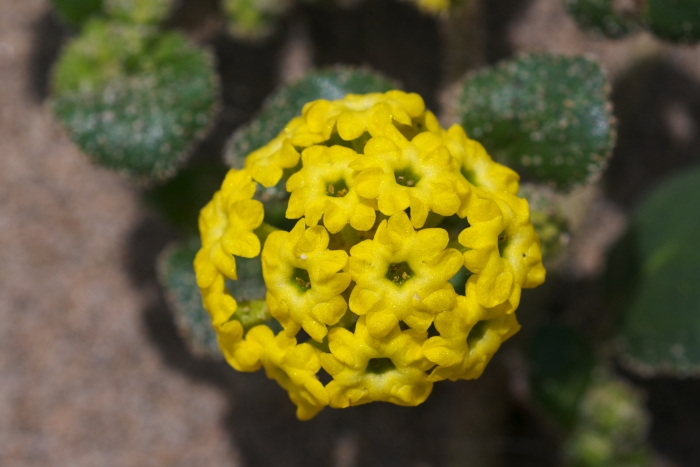Coastal Sand Verbena
(Abronia latifolia)
Coastal Sand Verbena (Abronia latifolia)
/
/

Eric in SF
CC BY-SA 3.0
Image By:
Eric in SF
Recorded By:
Copyright:
CC BY-SA 3.0
Copyright Notice:
Photo by: Eric in SF | License Type: CC BY-SA 3.0 | License URL: https://creativecommons.org/licenses/by-sa/3.0 | Uploader: Eric in SF | Publisher: Wikimedia Commons | Title: Abronia_latifolia2.jpg | Notes: * '''Description:''' Snowy River Wattle (''Acacia boormanii'') * '''Location:''' Australian National Botanic Gardens, Canberra, Australian Capital Territory, Australia * '''Date:''' 2005-09-21 * '''Source:''' picture taken by [[User:dlanglois|Danielle Lan |






















































Estimated Native Range
Summary
Abronia latifolia, commonly known as Coastal Sand Verbena, is a deciduous perennial herb native to coastal dunes and sandy beaches along the Pacific Coast of North America, from central California to British Columbia. It typically forms low-growing mats reaching 0.3-0.5 feet (0.09-0.15 meters) in height and spreading 3-7 feet (0.9-2.1 meters) wide. The plant is characterized by its succulent, bright green leaves and clusters of fragrant, yellow, trumpet-shaped flowers that bloom from late spring to early fall, attracting pollinators such as bees and butterflies.
Coastal Sand Verbena is valued for its ability to stabilize sand dunes and its resilience to salt spray, making it an excellent choice for coastal restoration projects and seaside gardens. It thrives in full sun and requires well-drained soils, tolerating low to medium water conditions. While it can withstand some saltwater exposure, it does not require saltwater to grow and can survive with fresh water irrigation. The plant’s deep, fusiform roots are notable for their historical culinary use by the Chinook Indians. Gardeners should be aware that while it is drought-tolerant, it does not tolerate extreme drought conditions.CC BY-SA 4.0
Coastal Sand Verbena is valued for its ability to stabilize sand dunes and its resilience to salt spray, making it an excellent choice for coastal restoration projects and seaside gardens. It thrives in full sun and requires well-drained soils, tolerating low to medium water conditions. While it can withstand some saltwater exposure, it does not require saltwater to grow and can survive with fresh water irrigation. The plant’s deep, fusiform roots are notable for their historical culinary use by the Chinook Indians. Gardeners should be aware that while it is drought-tolerant, it does not tolerate extreme drought conditions.CC BY-SA 4.0
Plant Description
- Plant Type: Herb
- Height: 0.3-0.5 feet
- Width: 3-7 feet
- Growth Rate: Rapid
- Flower Color: Yellow
- Flowering Season: Spring, Summer, Fall
- Leaf Retention: Deciduous
Growth Requirements
- Sun: Full Sun
- Water: Low, Medium
- Drainage: Fast
Common Uses
Bee Garden, Butterfly Garden, Groundcover, Salt Tolerant
Natural Habitat
native to coastal dunes and sandy beaches along the Pacific Coast of North America, from central California to British Columbia
Other Names
Common Names: Yellow Sand-Verbena, Coastal Sand-Verbena, Abronie À Feuilles Larges
Scientific Names: , Abronia latifolia, Abronia arenaria, Tricratus arenarius,
GBIF Accepted Name: Abronia latifolia Eschsch.